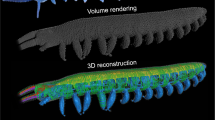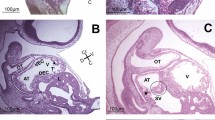Abstract
The hearts of all snakes and lizards consist of two atria and a single incompletely divided ventricle. In general, the squamate ventricle is subdivided into three chambers: cavum arteriosum (left), cavum venosum (medial) and cavum pulmonale (right). Although a similar division also applies to the heart of pythons, this family of snakes is unique amongst snakes in having intracardiac pressure separation. Here we provide a detailed anatomical description of the cardiac structures that confer this functional division. We measured the masses and volumes of the ventricular chambers, and we describe the gross morphology based on dissections of the heart from 13 ball pythons (Python regius) and one Burmese python (P. molurus). The cavum venosum is much reduced in pythons and constitutes approximately 10% of the cavum arteriosum. We suggest that shunts will always be less than 20%, while other studies conclude up to 50%. The high-pressure cavum arteriosum accounted for approximately 75% of the total ventricular mass, and was twice as dense as the low-pressure cavum pulmonale. The reptile ventricle has a core of spongious myocardium, but the three ventricular septa that separate the pulmonary and systemic chambers—the muscular ridge, the bulbuslamelle and the vertical septum—all had layers of compact myocardium. Pythons, however, have unique pads of connective tissue on the site of pressure separation. Because the hearts of varanid lizards, which also are endowed with pressure separation, share many of these morphological specializations, we propose that intraventricular compact myocardium is an indicator of high-pressure systems and possibly pressure separation.






Similar content being viewed by others
References
Acolat L (1943) Contribution à l’anatomie comparée du cæur, et en particulier du ventricule, chez les batraciens et chez les reptiles (thèse). Faculté des Sciences de Nancy, Besançon
Andersen JB, Rourke BC, Caiozzo VJ, Bennett AF, Hicks JW (2005) Postprandial cardiac hypertrophy in pythons. Nature 434:37–38
Benninghoff A (1933) Das Herz. In: Bolk L, Göppert E, Kalius E, Lubosch W (eds) Handbuch der vergleichenden Anatomie der Wirbelthiere, vol 6. Urban and Schwartzenberg, Berlin, pp 467–556
Brücke E (1852) Beiträge zur vergleichenden Anatomie und Physiologie des Gefäss-Systemes. Denkschrift der Kaiserliche Akademie der Wissenschaften in Wien, Mathematisch-Naturwissenschaftliche Klasse 3:335–367 (with Taf. XVIII-XXIII)
Burggren W, Johansen K (1982) Ventricular hemodynamics in the monitor lizard Varanus exanthematicus: pulmonary and systemic pressure separation. J Exp Biol 96:343–354
Burggren W, Farrell A, Lillywhite H (1997) Vertebrate cardiovascular systems. In: Dantzler WH (ed) Handbook of physiology, Sec 13: comparative physiology, vol 1. American Physiological Society, Oxford, pp 215–308
Chetboul V, Schilliger L, Tessier D, Pouchelon J-L, Frye F (2004) Particularités de l’examen échocardiographique chez les ophidians. Schweiz Arch Tierheilkd 146:327–334
Corti A (1847) Dissertatio inauguralis anatomica de systemate vasurum Psammosauri grisei. Universitate Vindobonensi, Vienna (with Figs. I-XV)
de Marees van Swinderen JW (1929) Het reptielenhart. Ned Tijdschr Geneeskd 73:397–398
Farrell AP, Gamperl AK, Francis ETB (1998) Comparative aspects of heart morphology. In: Gans C, Gaunt AS (eds) Biology of the reptilia, vol 19 (Morphology G). Society for the Study of Amphibians and Reptiles, Ithaca, pp 375–424
Goodrich ES (1919) Note on the reptilian heart. J Anat 53:298–304
Goodrich ES (1958) Chapter X. Vascular system and heart. In: Studies on the structure and development of vertebrates. Dover, New York, pp 506–77
Greil A (1903) Beiträge zur vergleichenden Anatomie und Entwicklungsgeschichte des Herzens und des Truncus Arteriosus der Wirbelthiere. Morphologische Jahrbuch 31:123–210
Gundersen HJG, Bendtsen TF, Korbo L et al (1988) Some new, simple and efficient stereological methods and their use in pathological research and diagnosis. APMIS 96:379–394
Hagensen MK, Abe AS, Falk E, Wang T (2008) Physiological importance of the coronary arterial blood supply to the rattlesnake heart. J Exp Biol 211:3588–3593
Heisler N, Glass ML (1985) Mechanisms and regulation of central vascular shunts in reptiles. In: Johansen K, Burggren WW (eds) Cardiovascular shunts: phylogenetic, ontogenetic and clinical aspects. Munksgaard, Copenhagen, pp 334–354
Hicks JW (1998) Cardiac shunting in reptiles: mechanisms, regulation and physiological functions. In: Gans C, Gaunt AS (eds) Biology of the reptilia, vol 19 (Morphology G). Society for the Study of Amphibians and Reptiles, Ithaca, pp 425–483
Holmes BE (1975) A reconsideration of the phylogeny of the tetrapod heart. J Morphol 147:209–228
Hopkinson JP, Pancoast J (1837) On the visceral anatomy of the Python (Cuvier), described by Daudin as the Boa Reticulata. Trans Am Philos Soc 5:121–136
Jacobson ER, Homer B, Adams W (1991) Endocarditis and congestive heart failure in a Burmese python (Python molurus bivittatus). J Zoo Wildl Med 22:245–248
Jacquart H (1855) Mémoire sur les organes de la circulation chez le serpent Python. Ann Sci Natur 4 Sér 321–364
Jensen B, Wang T (2009) Hemodynamic consequences of cardiac malformations in two juvenile ball pythons (Python regius). J Zoo Wildl Med 40:752–756
Jensen B, Nielsen JM, Axelsson M, Löfman C, Wang T (2010) How the python separates flow and pressure. J Exp Biol (in press)
Kashyap HV (1959) The reptilian heart. Proc Natl Inst Sci India 26B:234–254
Kashyap HV (1975) Muscular architecture of the ophidian ventricle. J Herpetol 9:93–102
Khalil F, Zaki K (1964) Distribution of blood in the ventricle and aortic arches in reptilia. Z Vergl Physiol 48:663–689
Leene JE, Vorstman AG (1930) A note on the structure of the heart of Varanus as compared with other reptilian hearts. Tijdschr Ned Dierkunde Vereeniging Leiden 2:62–66
Lillywhite HB, Donald JA (1989) Pulmonary blood flow regulation in an aquatic snake. Science 245:293–295
López D, Durán AC, de Andrés AV, Guerrero A, Blasco M, Sans-Coma V (2003) Formation of cartilage in the heart of the Spanish Terrapin, Mauremys leprosa (Reptilia, Chelonia). J Morphol 258:97–105
MacKinnon MR, Heatwole H (1981) Comparative cardiac anatomy of the reptilian. IV. The coronary arterial circulation. J Morphol 170:1–27
Mathur PN (1944) The anatomy of the reptilian heart. I. Varanus monitor (Linné). Proc Indian Acad Sci 20B:1–29
Meinertz T (1952) Das Herz und die großen Blutgefäße bei det Komodoeidechse, Placovaranus komodoënsis Ouw. Z Anat Entwickl 116:315–325
Meinertz T (1966a) Eine Untersuchung über das Herz bei Tuatara, Sphenodon (Hatteria) punctus Gray. Gegenbaurs Morphol Jahrb 108:568–594
Meinertz T (1966b) Weitere Bemerkungen über das Herz bei Placovaranus komodoënsis Ouw. sowie eine Untersuchung über das Herz bei anderen Kriechtieren, namentlich im Hinblick auf den Truncus arteriosus und die Ventrikelräume. Gegenbaurs Morphol Jahrb 109:411–433
O’Donoghue CH (1918) The heart of the leathery turtle, Dermochelys (Sphargis) Coriacea. with a note on the septum ventriculorum in the reptilia. J Anat 13:467–480
Overgaard J, Stecyk JAW, Farrell AP, Wang T (2002) Adrenergic control of the cardiovascular system in the turtle Trachemys scripta. J Exp Biol 205:3335–3345
Pettigrew JB (1864) On the arrangement of the muscular fibers in the ventricles of the vertebrate heart, with physiological remarks. Philos Trans R Soc Lond 154:445–500
Poupa O, Lindström L (1983) Comparative and scaling aspects of heart and body weights with reference to blood supply of cardiac fibers. Comp Biochem Physiol 76A:413–421
Rishniw M, Carmel BP (1999) Atrioventricular valvular insufficiency and congestive heart failure in a carpet python. Austral Vet J 77:580–583
Robb JS (1965) Comparative basic cardiology. Grune & Stratton, New York
Rush EM, Donnelly TM, Walberg J (2001) What’s your diagnosis? Cardiopulmonary arrest in a Burmese python. Lab Anim 30:24–27
Schilliger L, Chetboul V, Tessier D (2005) Standardizing two-dimensional echocardiographic examination in snakes. Exot DVM 7.3:63–74
Seymour RS (1987) Scaling of cardiovascular physiology in snakes. Am Zool 27:97–109
Simons JR (1965) The heart of the Tuatara Sphenodon punctatus. J Zool 146:451–466
Sklansky MS, Levy DJ, Elias WT et al (2001) Reptilian echocardiography: insights into ontogeny and phylogeny? Echocardiography 18:531–533
Snyder PS, Shaw NG, Heard DJ (1999) Two-dimensional echocardiographic anatomy of the snake heart (Python molurus bivittatus). Vet Radiol Ultrasound 40:66–72
Starck JM (2009) Functional morphology and patterns of blood flow in the heart of Python regius. J Morphol 270:673–687
Van Mierop LHS, Kutsche LM (1981) Comparative anatomy of the ventricular septum. In: Wenink ACG, Oppenheimer-Dekker A, Moulaert AJ (eds) The ventricular septum of the heart. Nijhoff, The Hague, pp 35–46
Van Mierop LHS, Kutsche LM (1985) Some aspects of comparative anatomy of the heart. In: Johansen K, Burggren WW (eds) Cardiovascular shunts: phylogenetic. ontogenetic and clinical aspects. Munksgaard, Copenhagen, pp 38–56
Vorstman AG (1933) The septa in the ventricle of the heart of Varanus komodoensis. Proc R Acad Amsterdam 36:911–913
Wang T, Hicks JW (2002) An integrative model to predict maximum O2 uptake in animals with central vascular shunts. Zoology 105:45–53
Wang T, Altimiras J, Axelsson M (2002) Intracardiac flow separation in an in situ perfused heart from Burmese python Python molurus. J Exp Biol 205:2715–2723
Wang T, Altimiras J, Klein W, Axelsson M (2003) Ventricular haemodynamics in Python molurus: separation of pulmonary and systemic pressures. J Exp Biol 206:4241–4245
Webb GJW (1979) Comparative cardiac anatomy of the reptilia. III. The heart of crocodilians and an hypothesis on the completion of the interventricular septum of crocodilians and birds. J Morphol 161:221–240
Webb GJW, Heatwole H, de Bavay J (1971) Comparative cardiac anatomy of the Reptilia. I. The chambers and septa of the varanid ventricle. J Morphol 134:335–350
Webb GJW, Heatwole H, de Bavay J (1974) Comparative cardiac anatomy of the reptilia. II. A critique of the literature of the Squamata and Rhynchocephalia. J Morphol 142:1–20
White FN (1959) Circulation in the reptilian heart (Squamata). Anat Rec 135:129–134
Young BA (1994) Cartilago cordis in serpents. Anat Rec 240:243–247
Young BA, Lillywhite HB, Wassersug RJ (1993) On the structure of the aortic valves in snakes (Reptilia: Serpentes). J Morphol 216:141–159
Young BA, Street SL, Wassersug RJ (1994) Anatomical and gravitational influences on cardiac displacement in snakes (Lepidosauria, Serpentes). Zoomorphology 144:169–175
Zaar M, Overgaard J, Gesser H, Wang T (2007) Contractile properties of the functionally divided python heart: two sides of the same matter. Comp Biochem Physiol 146A:163–173
Acknowledgments
This study was supported by The Danish Research Council.
Author information
Authors and Affiliations
Corresponding author
Rights and permissions
About this article
Cite this article
Jensen, B., Nyengaard, J.R., Pedersen, M. et al. Anatomy of the python heart. Anat Sci Int 85, 194–203 (2010). https://doi.org/10.1007/s12565-010-0079-1
Received:
Accepted:
Published:
Issue Date:
DOI: https://doi.org/10.1007/s12565-010-0079-1




